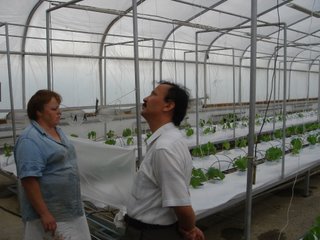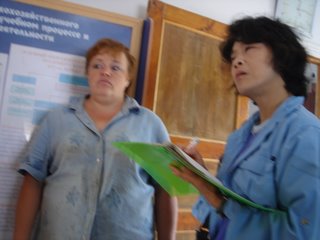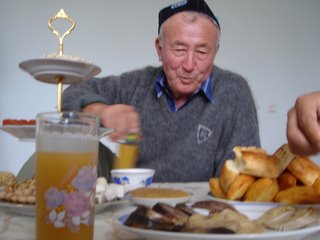


Thursday September 7 (Day Eight)
Meeting with Bota, Social Scientist
In the morning Vice-President of the university and Ms. Bota, the vice-director of social research institute, came to hotel to register and introduce us to the Kyzylorda oblast government. In Kyzylorda you don`t have anything you can do without the permission of the government and anything you cannot do with the permission of the government. We were heading for the government with some worries about our future in this research trip.
Interview with Vice-Governor in Economy
When we were led to the office of the vice-governor of the Kyzylorda, I realized that this research trip is becoming much more official than that we have expected. “Reception by the Vice-President of the University, and now we are going to meet the Vice-Governor of the Kyzylorda”
In front of the government building Lyalya and I stopped Miyuki trying to pull her camera out of the bag to take a photo of the government building. Probably we were much more nervous than her.
Bota seemed to know many people in the government. She told us that the guy she greeted at the lobby was one of Vice-Governors. I was a bit relived but my head was making noises in processing expected Q&As.
Mr Kuttikozha Idrisov, the Vice-Governor we met was stern-looking Kazakh with moustaches. From the beginning we looked very much reluctant to listen to Bota’s explanation. He interrupted her several times with short questions to confirm the fact. Now there was the question to us. “Why do you want to do research on poverty particularly in Kyzylorda”. Bingo! Of course that was one of the expected Q&As.
I answered that question and he seemed to agree to my answer. He seemed to have called all the chiefs of the relevant managers. Chief in Economy Dept., Social Affairs, and Statistics were called and they were with us. And I could feel that that stern guy decided to allow us to do research in Kyzylorda, which means we have a strong institutional backup in Aralisk too. One of the last comments he made an emphasis on was we were supposed to pay for all the statistics. “Of course,” I said in a very clear voice, in Japanese, of course.
Once we got the permission from that guy, everything was smooth. After having Kooksi for lunch we went to the statistics agency and looked through the list of the statistics and chose some we want to buy. Even the lady, vice-director of the statistics agency, seemed to be very much friendly and we got the information on the map of Kyzylorda. We saw the map made in 1992 of the environment of Kyzylorda area. I thought myself that “Prof. Ishida may not have that map”. We decided to buy 6 copies of the map. She even introduced the bureau in charge of various maps to us and we visited it. They had a very much detailed map of each rayon in Kyzylorda and city map of Kyzylorda city. We ordered the Aralsk map of population density and city maps.
It was the day of great leap forward in our research. We had a substantial number of statistics, maps and most of all, the institutional back-up from the Kyzylorda government. I felt something very good inside of me and felt like becoming a real expert on Kazakhstan.
Interview with Vice-Governor in Social Activities
In Kyzylorda there are four vice-governors in charge of economy, social activities, agriculture, and construction. After the meeting with the vice-governor of economy, we met the vice-governor of social activities. He seemed to be very much into the cultural activities and he explained us about the importance of the preservation of the tradition of Kazakhstan. He particularly emphasised the importance of preservation of Zerau, the oral discourse of Kazakhstan which was originated from legendary Korkyt Ata (Korkutata), the Kazakh version of minnezinger. Korkyt Ata seemed to have a great effect on the culture of the people in Kyzylorda region but we could not find the book about him written in English. He was born in 7th century and before he was born he spent 7 years in his mothers` womb. When he was born, the bad climate which had affected the region became good and there was a camel for him. He travelled around the region with the traditional two-string musical instrument called Tombli to sing a song and his song contained profound philosophy moving people`s mind. The only thing Korkyu Ata, such a philosopher and artist as he was, could not accept was the death. He was escaping from the death, but he could not, and died in one place called ******.
Maps of Kyzylorda City.
After the meeting with the Vice-Governnor in Social Activities, we went to another government office to get the map of Kyzylorda city. They were very kind to us and it seemed that the order of the Vice-Governor in Economy had a great effect in our activities. We selected several maps and they promised to give them to us on Monday.




















































